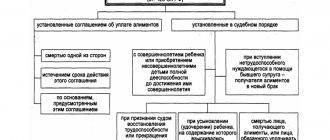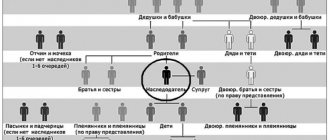What is arrears of alimony obligations?
Collection of alimony debt is a set of actions aimed at receiving funds for alimony obligations. Debt arises as a result of non-compliance with payment requirements. In this case, alimony obligations can be directed not only to one of the former spouses, but also to children - for the maintenance of parents.
According to the legislation, in particular, the information specified in the RF IC, the debt is formed after one day from the moment the established payment procedure was not followed. From this moment on, you can collect the alimony debt.
It is important to know: collection of alimony debt is traditionally carried out using a writ of execution with the assistance of the bailiff service. However, even if the claimant for certain reasons did not turn to the bailiffs for help, this is not a reason not to pay money for alimony obligations. The amount of debt will accumulate from the moment of non-payment, and not from the moment of initiation of judicial or enforcement proceedings.
Despite the fact that the collector cannot independently hold the debtor accountable as part of the collection of alimony debt, he can use the help of lawyers, go to court or the bailiff service.
Appeal to the Prosecutor's Office
The body to which citizens can send claims and complaints is the prosecutor's office. She considers requests on any issues. The function of the prosecutor's office is to monitor compliance with legislative norms. If the ex-spouse does not pay child support for children under 18 years of age, but the bailiffs do not take any action, the applicant contacts the prosecutor's office.
Upon request, a complaint is prepared against employees of the Federal Bailiff Service. It is compiled in free form. It is important that it is not anonymous.
The applicant's information must include:
- Full name of the citizen who applied;
- residential address;
- Contact details.
If during the inspection it is revealed that the husband does not pay alimony, and the bailiffs do not take any action to collect the debt, the prosecutor sends a demand to the territorial branch of the Federal Bailiff Service to fulfill official duties. In addition, a criminal case is initiated against the debtor.
Collection of alimony debt: for what reason can arrears arise?
Before collecting alimony debt, it is not necessary to consider the reason for the debt. However, in some cases the reasons are taken into account in court:
- If the debt arose through the fault of the defaulter, sooner or later he will need to pay the full amount of money, otherwise disciplinary measures will be taken against the debtor;
- If the debt is not the fault of the citizen, he can avoid collecting the alimony debt. In this case, he will need to seek help from the magistrate's court with a request to reduce the amount of payment or to fully release him from the obligation.
It is important to understand: if a citizen does not want to be subject to collection of alimony debt, he will need to provide the court with evidence regarding good reasons. In this case, the decision can be appealed later if the reasons for non-payment have been eliminated.
Collection of alimony debt if there are no valid reasons for non-payment: what is worth knowing?
If the defaulter does not have valid reasons, he may face collection of alimony debt. Therefore, he is recommended to immediately take measures to pay off the debt on his own. There are also several recommendations that should be followed:
- You cannot hide from collectors or representatives of the bailiff service. If the debtor begins to hide, he may be recorded in the category of malicious defaulters - such citizens are subject to criminal liability;
- If enforcement proceedings have been initiated against a citizen to collect alimony debt, the optimal solution would be to independently contact a representative of the FSSP service, and, if possible, explain the circumstances of non-payment;
- It would also be a good idea to get an exact estimate from the bailiff about the debt that needs to be repaid. If the debtor does not agree with the amount of money offered, he has the legal right to challenge it.
Collecting alimony debt is not an easy procedure, even if you have a writ of execution in hand. That is why, according to statistical data, several million arrears have been accumulated in our country for alimentary obligations.
Probable terms of collection
There is a rule for determining the statute of limitations for claims, which is provided for in Articles 107, 113 of the IC. Statutes of limitations do not apply to the collection of alimony debt through the court, provided that the debt is due to the fault of the payer. In fact, the law stipulates that the recipient can receive arrears of alimony both before the child’s 18th birthday and after that.
An accurate determination of the deadlines for collection can only be made after considering all the accompanying circumstances of the case and each specific option has its own differences and features.
What work should bailiffs do to collect alimony debt?
According to the information specified in Russian legislation, the bailiff has the right to take measures to collect alimony debt after the amount of money for the debt has amounted to 10 thousand rubles. As part of the collection of alimony debt, he has the right to the following actions:
- Assign a specialized resolution according to which the debtor will not have the right to travel outside the Russian Federation, regardless of the reasons. Even if you need to leave the country for work reasons, it will be impossible to do this;
- Assign a resolution on a temporary ban on the use of special law. In most cases, this is the right to use a driver's license, but other measures may apply;
- Make various requests to departments and structures in order to search for liquid property and financial assets that can be used to pay off debt;
- Issue a resolution to collect alimony debt, which can be sent to the bank or to work. Such a resolution can also be directed at the debtor’s property - in the latter case, it is subject to seizure and subsequent sale.
The only way to avoid the presented procedures within the framework of collecting alimony debt is to pay the money yourself.
Is it possible to partially collect alimony debt?
It is possible to partially collect or pay off arrears on alimony obligations in several cases, which are provided for by domestic legislation:
- A citizen with a debt does not have liquid property or financial assets that can be seized by a bailiff. This is also true for those citizens who do not have a job;
- The debtor occupies a position with low pay. In this case, the penalty may be applied to his salary in an amount of no more than 70% of it.
In all other cases, when a citizen can pay the debt in a lump sum, collection of the alimony debt will be directed immediately for the entire amount.
What to do to collect alimony debt and achieve full payment?
What needs to be done if the defaulter does not want to make contact and has long forgotten about the debts to the children? The first thing to remember in such a situation is that the procedure for collecting alimony debt is the responsibility of a representative of the bailiff service. This means that the other party does not have the opportunity to take any actions independently - even if you involve human rights activists, the actions must be coordinated with bailiffs and carried out jointly with FSSP employees.
So, the first thing to do is get a writ of execution. This can be done by contacting the SSP directly if alimony obligations were established as part of the divorce proceedings. This will allow the FSSP representative to initiate a case to collect alimony debt. You can inform a service employee using several methods:
- Visit the FSSP office and report that payments on the debt obligation are not being observed, verbally or in writing. Additionally, the applicant can receive advice on what manipulations can be undertaken to receive funds;
- If no action has been initiated after the visit, you will need to contact the FSSP again. If after the first time the bailiff has not responded to the application, the citizen has the right to demand that he be provided with complete materials on the case;
- A good solution would be to enlist the support of an experienced and professional defense attorney. If you see that the bailiff is not working to collect alimony debt, contacting a law firm will help move the matter forward. The specialist will work together with the FSSP, and will also help to hold accountable employees who negligently perform their duties.
The work of a human rights defender is very closely related to the analysis of documentation, which makes it possible to track the work of the bailiff. The specialist will conduct analytics, after which he will be able to draw conclusions regarding whether some work is being carried out or not. If actions are taken, all that remains is to wait for positive results, or to involve human rights defenders in solving problems.
Another option for the lack of results in collecting alimony debt is a situation where the FSSP servant does not fully perform his duties. This will be evidenced by the absence in the case materials of relevant decisions, procedural requests, as well as other measures that are applied to the debtor. If you see a lack of activity in your case, you have the right to do the following:
- Draw up a procedural petition with a request to apply administrative penalties to the defaulter. The procedural petition is submitted directly to the bailiff;
- Seek help from the judicial authority, the prosecutor's office or the immediate supervisor of the bailiff. It would be best to do this if there is a possibility that a FSSP employee could have been bribed.
It is also recommended to entrust such a procedure to the employees of a law firm - they will carry out comprehensive work, thanks to which it will be possible to quickly and efficiently return the funds.
Accrual of penalties as an incentive to pay arrears of alimony payments
If arrears have arisen in the payment of child support for a certain period, the mother has the right to receive a penalty, its amount is established by an agreement that was drawn up between the parents when deciding on the issue of the father paying child support.
If alimony was imposed by force in court, the mother has the right to contact the judicial authorities and write a statement to collect a penalty for child support.
Its size is 0.5% on the debt incurred during the entire period of non-payment. This interest is accrued daily (Article 115 of the RF IC).
There is no statute of limitations for the penalty; the mother has the right to demand payment through the court at any time. But it is better if the period between demands is shortened so that large penalties do not stall the case of debt payment by the defaulter.
If the child has reached the age of majority, this does not deprive his mother of the right to go to court to demand the collection of a penalty. You can also demand the debtor to compensate for losses caused by the fact of non-payment of alimony. But this is not easy to do, since it will be necessary to confirm the fact of the connection between non-payments and the losses caused by this inaction.
Liability that can be applied to a defaulter when collecting alimony debt
If the arrears on alimony obligations amount to more than two months, the defaulter may be subject to administrative penalties:
- Penalties, the amount of which can reach 20 thousand rubles;
- Execution of administrative work, a period of up to 150 hours may be assigned;
- Arrest up to 15 days.
Administrative responsibility is assigned in accordance with the norms of the Code of Administrative Offenses of the Russian Federation. If the debtor is classified as a willful defaulter, a criminal case may be initiated against him in accordance with Article 157 of the Criminal Code of the Russian Federation. The bailiff can take similar measures if the defaulter avoids payments and hides from assigned duties. Also, initiating a criminal case is relevant if it is necessary to put the defaulter on the wanted list. In accordance with the Criminal Code of the Russian Federation, a citizen can receive up to a year in prison, up to 3 months of arrest, and up to a year of correctional labor.
Author of the article
Appeal to the senior bailiff
If the former spouse refuses to pay alimony voluntarily, the law provides for forced collection.
This procedure is carried out by bailiffs. The writ of execution is sent to the territorial department of bailiffs at the place of registration of the debtor. Based on the application, enforcement proceedings are initiated. The case will be assigned to an employee who must conduct control.
- Come to an appointment with the bailiff who is handling the case. Try to find out from him why debts are not collected from a debtor who does not pay child support. If the debtor has no property, he has nothing to describe, and the debt accumulates, this is an objective reason. But even in this situation, the bailiff should not remain idle. He must search for any property. For this purpose, requests are sent to Rosreestr, traffic police, and banks. If during the inspection it is determined that the debtor is maliciously evading payment, a criminal case is initiated under Article 157 of the Criminal Code of the Russian Federation;
- If it is not possible to establish contact and come to an agreement with the bailiff who is handling the case, a complaint is written to the head of the department, the senior bailiff. It is written in free form. The text indicates the reason for filing the complaint. When writing an application, you will need to provide evidence of the bailiffs' inaction. To do this, you can first write an application addressed to the bailiff so that he provides a list of activities that are being carried out in order to collect the debt. Failure to provide a response may prove the employee's inaction.
It is not always possible to get action from senior bailiffs, but this is a necessary measure, since without it it is impossible to contact higher authorities.










